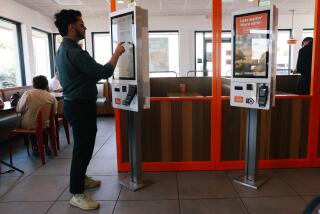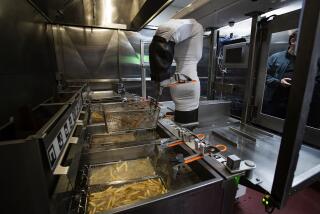Benefits From Robots Far From Automatic
- Share via
“Relax, Wage Slaves -- Robots Promise You an Endless Vacation,” by Marshall Brain (Commentary, Oct. 15), misses three points. First, his examples of the current use of robots (automated gas pumps and self-serve supermarket checkout lines) represent hidden price increases. We the consumers do more work, canceling out some of the benefits of lower prices (which result from lower labor costs).
Second, the introduction of robots increases the demand for labor to make, program and repair robots. Third, if robots are introduced in droves, the competition with workers will drive down wages (relative to labor productivity). Falling labor costs discourage further robotization.
James Devine
Professor of Economics
Loyola Marymount
University, Los Angeles
*
In his grandiose analysis of all the terrific things robots can do to make life simpler for Americans, Brain forgot to examine one small problem. Robots, just like humans, are subject to “illness.”
When a human gets sick and misses a day of work, however, it rarely shuts down the entire production of the business that day. But a virus that infects a robot whose system is linked to other robots could most definitely shut down all work systems of an entire business until the problem is rectified, potentially costing the company hundreds to millions of dollars.
How much freedom will humans actually have if their lives are dependent on a properly functioning machine to put food on their tables?
Autumn Hayner
Canyon Country
*
Brain suggests a “generous” stipend of $25,000 or $30,000 per year per person. To my knowledge, and in the region I live, that would represent a contribution that would be just about equivalent to the poverty-level income. What real economic freedom could this provide?
Chris Roberts
Playa del Rey
More to Read
Inside the business of entertainment
The Wide Shot brings you news, analysis and insights on everything from streaming wars to production — and what it all means for the future.
You may occasionally receive promotional content from the Los Angeles Times.










